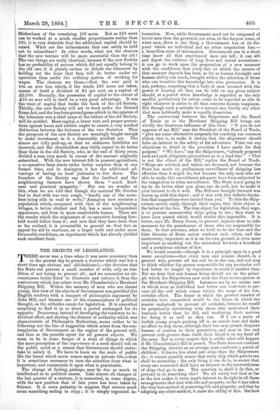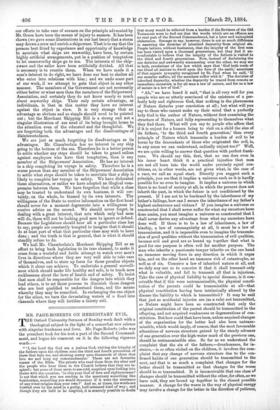THE OBJECTS OF LEGISLATION.
THERE never was a time when it was more necessary than in the present day to preach a doctrine which was but a • short time ago obvious and old-fashioned,—the doctrine that the State can prevent a small number of evils, only on con- dition of not trying to prevent all ; and we remember no cir- ctunstances better fitted to illustrate and enforce it than the controversy which has arisen over Mr. Chamberlain's Merchant Shipping Bill. Within the memory of men who are almost young, this view of the objects of Government was provided (for English readers) with a rampart of philosophic argument by John Mill, and became one of the commonplaces of political thought, as the orthodox canon for legislation. It is somewhat surprising to find it in so short a period exchanged for its opposite. Democracy, instead of developing the tendency to in- dividual effort, and sharing the distrust of authority which was characteristic of Philosophic Radicalism, seems rather to be following out the line of suggestion which arises from the con- templation of Government as the engine of the general will, and thus as the possible agent for all general objects. We seem to be in some danger of a state of things in which the mere perception of the importance of a need should tell on the public mind as a reason that Government should under- take to satisfy it. We have to learn on the scale of public life the lesson which never comes amiss in private life,—that it is sometimes necessary to turn the attention from what is important, and concentrate it upon what is practicable.
The change of feeling, perhaps, may be due as much to intellectual as to political causes. Like almost all changes of the last quarter of a century, it is connected, in some degree, with the new position that of late years has been taken by Science. It is mere pedantry to suppose that science must mean something ending in ology ; it is simply organised in-
formation. Now, while Government need not be composed of better men than the governed, nor even, in the deepest sense, of wiser men, there is one thing a Government has at its dis- posal which no individual and no other corporation has,— a boundless store of information. Government can in a short time know all that experienced men can tell ; it can sift and digest the evidence of long lives and varied avocations ; it can go to work upon the preparation of a new measure with the confidence that every fact on which the success of that measure depends has been, as far as human foresight and human ability can reach, brought within the attention of those who can translate this knowledge into wise precaution. It is not, perhaps, surprising that a body of men invested with the power of hearing all that can be told on any given subject should, at a period when knowledge is regarded as the only needful preliminary for action, come to be regarded as able to right whatever is amiss in all that concerns human happiness. But though such a mistake be a natural one, hardly any other that men habitually make is equally disastrous.
The controversy between the Shipowners and the Board of Trade as to the Merchant Shipping Bill brings out vividly the disastrous influence of this view. "If you do not approve of my Bill," says the President of the Board of Trade, "give me some alternative proposals for reaching our common
object, that is, to make it certain that the shipowner should have an interest in the safety of his adventure. Point out any objections in detail in the provision I have made for that purpose." "We have," say the Shipowners, "already proposed such and such obligatory precautions as to a load-line." "That is not the object of the Bill," replies the Board of Trade. "Ships are wrecked, and sailors are drowned, not because the State has made its preliminary surveillance of shipping less effective than it might be, but because the only men who are able to make this surveillance adequate have been subjected to the temptation to relax surveillance. The State is not going to try to do better what you alone can do well, but to make it your interest to do it well. The Bill now brought forward was drawn up with this object ; and it was with this definite limita- tion that suggestions were invited from you." To this the Ship- owners merely reply, through their organ, that their object is the better of the two. The true object for legislation, they urge, is to prevent unseaworthy ships going to sea ; they want to have laws passed which would render this impossible. It is better, says Mr. Henry Green, to prevent injuries than to take measures for the punishment of those who are responsible for them. In that sentence, what we hold to be the true and the false theories of State action confront each other, and the controversy, important as it is on its own ground, is even more important as marking out the watershed between a beneficial and a pernicious scheme of law.
We would concede—though it is a principle open to a good many exceptions—that every man and woman should, in a general way, prevent all the evil he or she can, and not stop to think whether the person responsible for any particular evil had better be taught by experience to avoid it another time. But we deny that any human being should act on the princi pie which the Shipowners now wish the State to incorporate in the Merchant Shipping Bill. Instances are by no means rare in which even an individual had better not undertake to pre- vent all the evil which comes within the scope of his con- ceivable effort. The house in which the greatest number of mistakes were committed would be the house in which the master undertook to prevent• all mistakes, because he would be perpetually interfering with those who understood their business better than he did, and weakening their motives for doing it as well as they can. If I see a party of foolish young people pushing off in an unsafe boat and make no effort to stop them, although their loss may preach eloquent. lessons of caution to their generation, and may in the end prevent evils greater than itself, their blood is on my head all the same. But in every respect this is unlike what will happen if Mr. Chamberlain's Bill is passed. The State does not confront the Shipping interest as an average man confronts a parcel of children ; it knows less about safe ships than the Shipowners do ; it cannot possibly secure that every ship which puts to sea shall be seaworthy ; the only thing it can do is, to secure that every one concerned shall have an interest in the seaworthiness of ships that go to sea. The question is, shall it do this, or pretend to do something else? We all surely feel that so far as the law makes it every man's interest to do right in all those arrangements that deal with life and property, so far it has taken the very best method of preserving life and property, and that by adopting any other method, it mars the utility of this. See how
our efforts to take care of seamen on the principle advocated by Mr. Green have been the means of injury to seamen. It has been shown (we gave some illustrations in our last issue) that a storm may drown a crew and enrich a shipowner. That is to say that the persons best fitted by experience and opportunity of knowledge to ascertain what ships are seaworthy, have been, by certain highly artificial arrangements, put in a position of temptation to let unseaworthy ships go to sea. The interests of the ship- owner and the sailor have been artificially divided. All that is necessary is to reunite them. When we have made it a man's interest to do right, we have done our best to shelter all who enter into relations with him ; and we undo some part of our work, if we attempt to gain that object in any other manner. The members of the Government are not necessarily either better or wiser men than the members of the Shipowners' Association, and certainly they do not know nearly so much about seaworthy ships. Their only certain advantage, as individuals, is that in this matter they have no interest against the object in view. It is very strange that an advantage so obvious and so simple should need to be pointed out ; but the Merchant Shipping Bill is a strong and not a singular illustration of our need of its being brought home to the attention even of the educated and the thoughtful. We are forgetting both the advantages and the disadvantages of disinterestedness.
We are just as much forgetting its disadvantages as its advantages. Mr. Chamberlain has no interest in any ship going to the bottom of the sea. Therefore he is a better person to settle whether any steps should be taken to guard sailors against employers who have that temptation, than is any member of the Shipowners' Association. He has no interest in a ship completing its voyage in safety. Therefore he is a worse person than any member of the Shipowners' Association to settle what steps should be taken to ascertain that a ship is likely to complete her voyage in safety. We have dislocated these alternatives, or rather we have adopted an illogical com- promise between them. We have forgotten that while a class may be trusted to understand its own business, it will cer- tainly, on the whole, be biassed by its own interests. The willingness of the State to receive information on the first head should never for a moment degenerate into a willingness to receive advice on the second. We should never forget, in dealing with a great interest, that acts which only bad men will do, there will not be lacking good men to ignore or defend. Because the Legislature should hear all a particular class has to say, people are constantly tempted to imagine that it should do at least part of what that particular class may wish to have done ; and the truth is that in general, that is what it should steadily refuse to do.
We hail Mr. Chamberlain's Merchant Shipping Bill as an effort to bring back legislation to its true channel, to make it cease from a wasteful and futile attempt to watch over men's lives in directions where they are very well able to take care of themselves, and to store up force for those peculiar objects which it alone can achieve. To undertake a general surveill- ance which should make life healthy and safe, is to teach men recklessness about the laws of health and of safety. To insist that men shall be responsible for the dangers into which they lead others, is to set those persons to diminish these dangers who are best qualified to understand them, and the means whereby they may be remedied. In exchanging the one object for the other, we turn the devastating waters of a flood into channels where they will fertilise a thirsty soil.



































 Previous page
Previous page